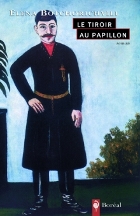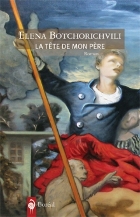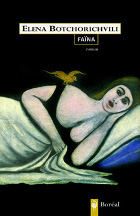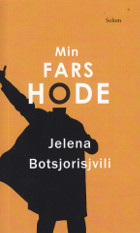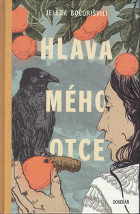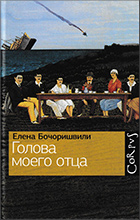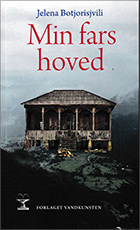Elena Botchorichvili
„My Father’s Head“, „Drizzle“, „Faina“, „The Magic Balm“ Novels
Proposal
Critics call Elena Botchorichvili’s books stenographic novels, as her stories are so densely written, almost in telegraphic style, covering many generations of Georgian families in the Soviet and post-Soviet period. Botchorichvili’s novels are reminiscent of Arundhati Roy’s “The God of Small Things” or Álvaro Pombo’s “The Island of Women”, and tell of love which often takes strange forms, and where the protagonists resemble exotic birds.
For example, there is the circus artist, singer and ventriloquist Mziya from the novel “My Father’s Head”, who “is a celebration, not a woman”. She even appears in a film – she undresses on the beach, but only her slender ankles can be seen, but her bra falls on to a rock, and the audience is stunned. She is later often invited to the film studio, but only because people remember her for her bra. Her beauty is too conspicuous and voluptuous for these times, when life resembles a black-and-white film: people wear grey and black clothes, and their faces are grey with hunger: there are dark houses in grey streets, the walls are black with damp, and the horses themselves in the street are grey and black as the cars. People are afraid of Mziya’s beauty, because a woman who makes white hats out of toilet paper (which was only available in special shops for important party members, and only two rolls per person) is very dangerous. In 40 years of marriage, Mziya’s husband has never noticed that her dance-like gait, which he once called a “reed in the wind” in the heat of an argument, is only meant to conceal her inborn limp. In Canada, where Mziya’s son takes her after the death of his father, with Mziya, one of Mziya’s singing students, a 20-year-old man, falls in love with her, and she only manages to extricate herself from this affair with difficulty. She purses her lips and says: “We’ll start from the beginning, from the same note!” “Perhaps she thought it was possible in life to begin everything over again, from the same note. Where did she get this inexhaustible, wild joy for life? Perhaps my mother was a great actress, the greatest of all unknown actresses.”
Or take Nadya in the novel “Faina”. All the children in her large family come to visit Nadya in Kutaisi every summer. “She went to meet them on the platform. A small, crooked-legged woman with a large bag, always dressed in black. The children were her grandchildren, nephews and nieces, and they fell out of the wagon like mandarins. They hugged and kissed Nadya, tickled by her ginger goatee”. Nadya likes to rehearse her funeral with the children. “She distributed the roles – you let your hair down, child, rub your face and cry: These Kobaidzes killed my grandmother! Raise your arms up to the sky, like this, and ask: Why doesn’t the earth swallow these monsters? Look around at everyone – very slowly! – and say: There’s no justice on earth! Usually, this was the moment that her husband Andro Kobaidze looked into the room and asked (always the same thing): “Shall I heat up the khachapuri, or is there something else to eat?” That was perhaps the longest sentence that he ever said. Then Nadya went into the kitchen to make lunch – she was capable of making a meal for 30 people on her own – and they said that she had sent as many men to their graves as her sister Nutsa had taken to bed”.
Or Archil (“The Magic Balm”), about whom married women told legends. “People said different things – that he sang romances for other men’s wives while he undressed them, or that they undressed themselves when he sang. But the main thing was that he gazed at them very intently, as if he were seeing a naked woman for the first time. As though he were a little boy who had accidentally run into someone else’s bedroom. And then he would draw on them. He would dip his finger into black powder and run it over the woman’s body as if it were a piece of paper. Whether it was because of his hypnotic gaze or the mysterious, sparkling powder, the women turned into lionesses, into fire-breathing princesses, their sacred triangle flamed up like the stoves of locomotives, and they shot up to the sky and shrieked with strange voices: “Arr! Arrrrchil!”
Sometimes love plays mean tricks on Elena’s characters. In the novel “The Magic Balm”, Tengiz, the son of a respected doctor, who has the 300-year-old recipe for a magic curative ointment, marries the wrong sister. He chooses the silent Nora, but can only sleep with her when he hears the pealing laughter of Pepela, who otherwise only talks nonsense. But Pepela is also unhappy, because she is in love with the crazy red-haired Kosta, who walks around the dusty streets with a silent, colorful parrot. “They said that the parrot lives 200 years, and could tell the future, and that the capitalists made hats for their wives with his feathers. It was unclear whether they tore the feathers off the bird while it was alive, or waited for 200 years.” One day, Kosta is riding through the town on the first bicycle in Kobuleti. “Barefoot boys ran behind him shouting. Old women came out of the gates and asked all the passers-by: Has that bicycle gone past yet? Was he riding it? Was he really sitting on the wheel? They froze in terror. Pepela’s brothers never forgave Kosta for this bicycle. And when he came to their low house with the earthen floor, with a marriage proposal for their sister, they refused him.”
Fate can sometimes play nasty tricks on the characters as well. The daughter of Prince Giorgi Areshidze (in the novel “Drizzle”) marries a Chekist, the head of the KGB in the city of Sukhumi. In 1936, when her father Giorgi and his wife Margarita were arrested, the man’s father Melor (whose name comes from the initials “Marx-Engels-Lenin-October-Revolution”) held the same position, and had the same office. Now Georgi learns from Melor’s son that his wife Margarita, for whose sake he hurried back to Georgia from Paris, and got caught up in the chaos of the revolution, Margarita, whose portrait he never parts with, because a love like this can only happen once in a lifetime, gave into Melor’s sexual harassment in exchange for the release of her husband. And then she disappeared.
Without pathos and theatrical effects, didacticism and superfluous words, with ease and humor, Elena Botchorichvili manages to teach her reader to love Georgia and the characters in her stories.
Critics have mentioned her magic realism, which contain a touch of melancholy and a burning hunger for life and happiness, and compare her novels with Chagall’s paintings, with Chekhov (for her tenderness), Gogol (for her satire), and Nina Berberova (for both of these).
This is the incredible Georgia with its inexplicable magic, a place which Soviet people thought was celebrating the eternal festival of life. Although life there was the same way that it was everywhere else in the Soviet Union. “They lived in an old courtyard in Tbilisi, three floors of balconies in a circle, like in a theater, and with a water tap in the middle of the courtyard. In the morning, the bare-chested men went out on to the shared balcony to smoke. The women took water from the tap, exchanged gossip like currency, and then went scurrying off to the shared stinking toilet. They also shared the kitchen, just as they shared their entire lives. And on every floor, the people argued.” (“Faina”).
But Georgia is bathed in sunlight, the earth brings forth wonderful wine (the rest of the country preferred vodka), hospitality is superb, and the tables sag beneath the weight of the food, even if the shelves in the shops are bare; men and women sing as if in one voice, and straighten their curly hair with a warm iron, so that they fall down on to the shoulders beautifully, like in a film, and every day they wear a different outfit, even if they have one dress: they sew on new buttons, or lace collar.
One critic has compared Elena Botchorichvili’s novels with an ocean liner, where a gypsy orchestra is playing on deck, and of course the song they are playing is “Black Eyes”. On this liner, people quarrel and love, sing, dance and cry a lot. All of the passengers on this ship are slightly mad, and dream of life more than they actually live it. But the ocean of history is stormy, and the passengers disappear in prisons, die in wars, and are senselessly killed by Soviet tanks, which unexpectedly mow down unarmed former fellow citizens – children, old people and women.
None of the protagonists can escape the course of time. They are swallowed, chewed up and spat out – only the lucky ones survive. Prince Areshidze (“Drizzle”), who qualifies as a dentist in Paris, is sent to Sukhumi after he is released from prison, before the town becomes a resort. Cows walk around Lenin Square, and teeth are not treated, they are simply pulled out.
Gogilo Samsonadze (“Faina”) shoots people, including women and children. The people have barely been covered with earth when new corpses are brought along – and so it continues from sunrise to sunset. “One can’t do a job like this sober… And once he is smoothing out the earth with a spade, to make it ready for the next morning, and a hand is sticking out of the earth, in such a shape as though it were holding a bunch of grapes or a women’s breast. He doesn’t notice it. Then he trips over this hand, and it grabs him by the leg, shakes the soul out of him, and then he lies in his room with no windows, drinks and pisses himself, beats his son, frightens women, and keeps on drinking”.
The grandmother of the narrator (“My Father’s Head”) receives 10 grams of butter for exceeding the plan at a work camp. She does not eat the butter, but rubs it on her face, out of fear that her son will not recognize her when she comes back. The former beauty comes back from the camp with her hair completely grey, and without a single tooth left.
The 16-year-old Tengiz (“The Magic Balm”) notices after his parents are arrested that the Chekists broke the ear off a bust of Stalin during their search of the house. This means his death by firing squad. “Every night, under the blanket he crushed the bust of Stalin in a stone mortar. It turned to powder. In the morning, he walked the streets with his fist clenched, slowly unbending his fingers. And the black and white Stalin was blown away by the wind… That is the reason that Tengiz Gomarteli was later able to kill people mercilessly in the war. He killed out of fear”. This is the war in which Stalin ruthlessly exchanges five of his soldiers for one German soldier, in the certainty that the women will give birth to new ones. The women do not want to give birth, but abortions are prohibited, and so they crawl on to the kitchen table of the former political prisoner Volodya (“Faina”), drink a glass of vodka instead of having an anesthetic, and spread their legs. Then Stalin dies, and Pepela (“The Magic Balm”) prays tearfully before an icon for the atheist: “He was a God, not a man!” “On this day, Nora saw Tengiz crying for the first time. And then Archil walked into the room, and saw his father’s bare feet above the round table. Tengiz Gomarteli, who had almost become a general, was hanging from the ceiling on an iron hook for the chandelier, his grey hair fell over his face, and his tongue rolled out of his mouth like a wheel that had fallen off a bicycle”. “People liked Stalin more than Khrushchev. Even those who had suffered during the repressions, even those who had been in prison. People simply couldn’t stand Khrushchev – he took away their belief without giving them anything in replacement”. (“My Father’s Head”).
The narrator’s father (“My Father’s Head”) holds various positions during his life, but always carries out the same task – he writes speeches for high-ranking persons. “He was the smallest among the important people. The party bosses changed, but my father remained. Every boss needed him.” During Brezhnev’s time, black caviar first vanishes from the shops, and then the shelves become completely bare, and even sewing needles become worth their weight in gold. And then finally, a man comes to power “who can hold in a fart” – Gorbachev delivered the unexpected news about the death of the Soviet Union, without asking the people. “Death is always unexpected, even if it has been predicted… Gorbachev chopped the Soviet Union into small pieces with just one phrase, but the body continued to writhe and quiver like a dead snake. The Soviet Army still fought for power, the largest army in the world. And there was still the KGB, immortal like any mafia. And the people kept shouting themselves hoarse in town squares – who’s in charge here, who?” (“Drizzle”)
“Giorgi’s second wife founded a party – there were now over 100 of them in Georgia. She declared the Tbilisi plastic surgeon Tsope to be an enemy of the people, because he had made Georgian women resemble Russian women.” (“Drizzle”).
With some difficulty, a mullah is found to say a prayer for an old Islamic cemetery that is about to be demolished, and turns up with a Koran under his arm that is wrapped in the newspaper “The Communist”.
Nadya (from “Faina”) dies from a stab wound to the stomach, but the murderer, a young man who was simply hungry, finds no money in her bag, only hundreds of old black-and-white photographs – “all faces of corpses”.
The narrator’s father (“My Father’s Head”) has put money in the savings bank for years to buy his wife a wedding ring, “even if it is 40 years since they got married. The cash desks were closed on the day of the sudden currency reform, and the next morning the money that was left was not enough to buy sausage and bread. If only he had kept the money in the mattress like everyone else! Then he could have shown her these pieces of paper like unwritten love letters”. Despite the Chernobyl disaster, the May parades are not cancelled. “The pioneers with bare knees sang and danced in the milky fog throughout the zone. Gorbachev eventually appeared on television in the second week. He asked the people what to do”. (“Drizzle”).
And then the war began. “It was a war of people who had lost the guidance of the state, as though they had lost the guiding hand of an older person. And now they were divided – by a phrase, nothing more – according to religious, ethnic, political or other considerations. It was a war for the seashore, for resort affairs, for the past which could never be returned. There were many sides fighting. The city was bombed by planes of the Soviet army, and who knows who had given them the order to do so. Every side was fighting for Lenin Square” (“Drizzle”)
“The crowd swiftly tore the still-warm body into pieces, and stoned the Soviet Union to death with fragments of the Berlin Wall. Freedom! The most peaceful time of the 20th century began, because wars stopped being world wars. Now they were split up into small, local wars, in which people were no longer killed en masse and in an unknown location – now your own father was killed in your own home. The Soviet tank left the military parades and attacked us defenseless people. And before this tank, from out of the smoke, the poor person with his belongings appeared, the hero of the new age. How does the modern, local war begin? The stupid people rush ahead, and the smart people run after them to stop them. And everyone dies.” (“My Father’s Head”). “More and more people came to the sea. In long black coats. With vacant expressions, and with their hands in their pockets. They stood by the water, as if they were standing by a window. The sun finally came out and bathed them in rosy light. Stray dogs, rosy with hunger, gathered in a pack and ran along the shore, with their stomachs dangling.” (“Drizzle”)
The war begins at the high point of the holiday season. The narrator’s father (“My Father’s Head”) goes to the seaside with a towel and yesterday’s newspaper. When shooting begins at one end of the city, at the other end people are still blowing up inflatable mattresses to sunbathe and float on. A few hours later, only a heap of bodies and many odd shoes are left. And Mziya with her tiny hands (her mother-in-law was always worried about how she would carry children with them, but she never did) can only find her husband’s head in the ruins of the city. “I have buried my father twice. The first time, we lowered him in a heavy zinc coffin into the ground at the Vake cemetery in Tbilisi. My mother mourned the empty grave so much that everyone sobbed. She was ready to throw herself into the grave, to warm the ground at the bottom of it. A great, unknown actress. But before that, we had buried father in the village of Tapla, which does not exist anymore. We placed an ‘Adidas’ sports bag in a small wooden box, forty paces from the log house where he was born. On a towering mountain peak… My mother suddenly laid her small hands on her face and cried softly: ‘I loved him very much,’ she whispered. ‘I loved him very dearly’.”
Later, after emigrating to Canada, during the five-day war in the Caucasus, the protagonist is watching television, and sees a familiar part of the road that leads from Gori to Tbilisi, with the church where his father, like all the other drivers, always stopped to throw a handful of small change out of the car, to the delight of the local children. There is a tank next to the church. This is just like the tank that he always saw at parades. “I hate and love – is that really nostalgia? Between me and the country where I was born, there are not years and distances, but the death of my father, his head that was buried separately from his body, under a tree with torn-up roots, in a village that does not exist anymore”.
In Elena Botchorichvili’s novels, the Soviet Union is not judged, and her protagonists have the right to think whatever they want. In her texts, they are free people, if you can call people free who have the right to die. But the Soviet Union means their youth, their hopes and their love…
“Now, after many years, hate and love for the Soviet Union live inside me at the same time. I am pained by the death of the country where I was born, as you are by the death of a loved one who suffered much, and whose death you longed for because you loved him… There was fear – light, habitual fear, more like a passive interest. Now Gorbachev has gone, and who will come next? There was a certainty that our future did not depend on us. No one asked us anyway. All we can do is wait and see.” (“My Father’s Head”)
